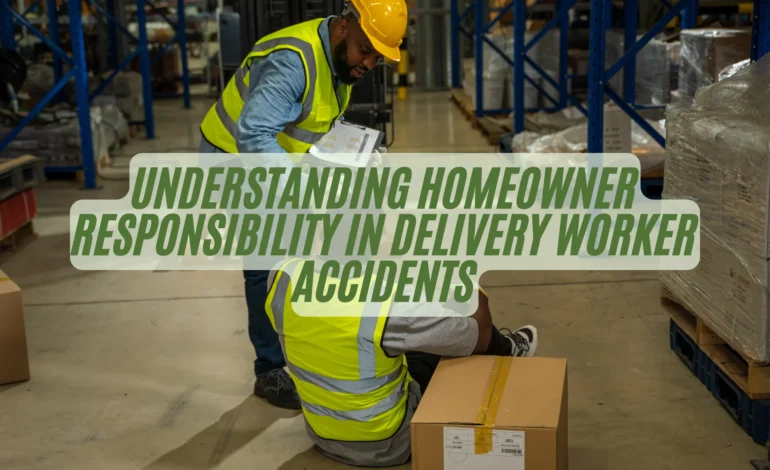
Understanding Homeowner Responsibility in Delivery Worker Accidents
In an era of booming e-commerce, delivery workers are a vital part of our daily lives. Whether it’s groceries, packages, or meal deliveries, these workers often navigate unpredictable environments. While their employers bear some responsibility for their safety, homeowners also play a critical role in preventing accidents on their property. Understanding homeowner liability can not only reduce legal risks but also create a safer experience for delivery professionals.
Table of Contents
Premises Liability and Delivery Workers
Premises liability is a fundamental legal principle that holds property owners accountable for maintaining a safe environment for visitors, including delivery workers. Under this doctrine, homeowners have a duty to ensure that their property is reasonably free of hazards that could cause harm. This obligation extends to maintaining clear walkways, securing pets, and addressing potential dangers such as slippery surfaces or uneven stairs.
Delivery workers are classified as “invitees” in most jurisdictions, meaning they are legally allowed to enter the property to perform their work. As invitees, they are entitled to a higher standard of care, and homeowners can be held liable if they fail to address known hazards or neglect to warn about potential risks.
Common Hazards Faced by Delivery Workers
Delivery workers face a variety of risks when entering private property. Among the most common are physical obstacles such as loose handrails, poor lighting, and icy sidewalks. In a study done by US Claims, it was found that dog bites and delivery workers are a significant risk, with delivery professionals often being attacked by dogs during their routes. Homeowners may be held legally liable for these incidents, particularly if their dog has a known history of aggression. Injuries stemming from untrained or aggressive pets can lead to costly legal claims, including personal injury lawsuits and damages for pain and suffering.
Other hazards include environmental risks like construction debris, water leaks, or malfunctioning gates. Even something as simple as a tripping hazard from toys left on a walkway can lead to accidents with serious consequences.
Legal Implications for Homeowners
When delivery workers are injured on a homeowner’s property, the legal ramifications depend on the nature of the hazard and the homeowner’s knowledge of it. For instance, if a homeowner knows about a broken step but fails to repair it or provide a warning, they could be deemed negligent in the event of an injury. Conversely, if an injury occurs due to an unforeseeable condition, liability may be less clear.
Homeowners may also face legal consequences under specific state laws. For example, strict liability statutes hold pet owners accountable for injuries caused by their animals, regardless of whether the pet had a history of aggression.
Best Practices for Homeowners
To minimize the risk of accidents and legal exposure, homeowners can adopt several proactive measures:
- Secure Pets: Always ensure that pets are safely confined during deliveries. A leash, kennel, or closed room can prevent unwanted interactions.
- Maintain Pathways: Regularly inspect and clear walkways of debris, snow, or ice. Repair uneven surfaces promptly to reduce tripping hazards.
- Improve Visibility: Install adequate lighting around entryways and pathways to help delivery workers navigate safely, particularly at night.
- Provide Clear Instructions: Use visible signage to direct delivery workers to safe areas of the property. If hazards exist, provide warnings or alternative access points.
- Address Known Issues: Promptly fix any hazards, such as broken steps or exposed wires, to avoid negligence claims.
The Role of Insurance
Homeowners’ insurance policies typically include liability coverage that can help pay for medical expenses or legal claims resulting from delivery worker injuries. However, coverage limits and exclusions vary, and pet-related incidents may require additional riders or endorsements. Homeowners should review their policies to ensure they have adequate protection in place.
Creating a safe environment for delivery workers is not only a moral obligation but also a legal one. By understanding their responsibilities and taking proactive steps to mitigate risks, homeowners can protect themselves from liability and contribute to the well-being of the workers who help keep modern life running smoothly.





